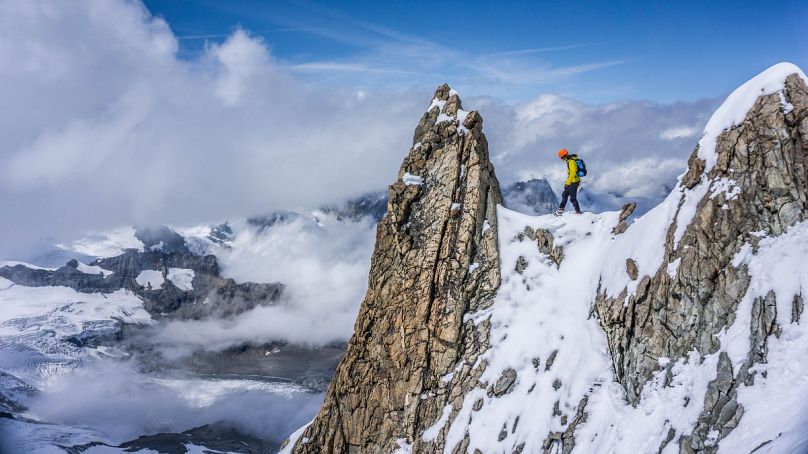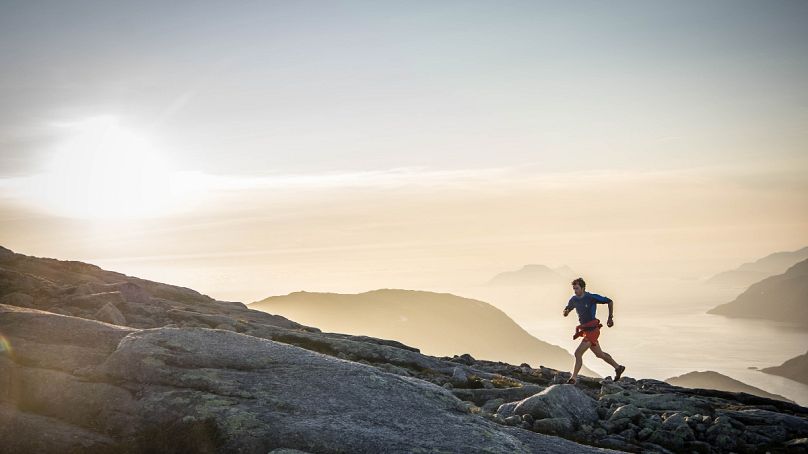2018 National Geographic’s Adventurer of the Year on his adventures, training and why being in the mountains is so important.
Kilian Jornet Burgada is a trail runner, ski mountaineer and professional athlete with a stunning array of accolades under his belt. Alongside attaining over 30 podium finishes in the ski mountaineering World Cup since 2008, he’s set fastest known times on a number of the world’s highest summits – not to mention completing a double ascent of Mount Everest in a single week – and in 2018 was named National Geographic’s Adventurer of the Year. Euronews Living It spoke to him about his adventures, his training and why being in the mountains is so important.
Congratulations on your new baby, what is it like being a father?
"It’s very exciting! I am very happy to have time to enjoy these moments at home"
How has this changed you training and exercise regime?
"For the moment, we manage well. My partner is also an elite athlete. She is getting slowly back in shape so we take turns to babysit and stay with the little one, but it hasn’t really changed my way of training"
Your reputation as an endurance athlete is well established, covered in the media and studied by sports scientists, but what do you think is behind your incredible feats?
"I’ve been training for 30 years, several hours every day, so it really is about persistence and a lot of training. I always say if you were a student for 30 years you’d probably know a lot about your subject. It’s the same for me, as I have learnt a lot about myself during this time and I’ve had the opportunity to build my body for these challenges."
How did you initially become interested in trail running and cross-country skiing?
"I grew up in a mountain hut in the Pyrenees and my parents started me on outdoor activities when I was very little. We went hiking in the summer and skiing in the winter, and from there I started to train more seriously when I was 13. Running was the best way to train during the summer, and also the easiest way to get quick and to discover new places."
What is it about these sports that interest you so much?
"There are many things. On the one hand, it gets me to places I’ve always dreamed of – by going fast, I can get to more places quicker. Also, it brings me the opportunity to meet new people and to test myself and my abilities"
A recent Outside article said you rack up more than 9,000 miles and almost 2 million vertical feet in training annually. How do you achieve these figures, and what does your weekly routine look like?
"I train every day. In the morning, I do around four to five hours and one to two in the evening. I try to rest one day a week. My training depends a bit on the season but it contains a lot of ascending, so that’s how these numbers are possible."
The mountains are obviously hugely important to you and your way of life. Why is this so?
"Mountains are my life. It's where I feel myself and happy, it’s the thing that brings me more joy, and also the thing that scares me the most. So definitely it’s my whole life."
You’ve said that you “conceive sport as a way to discover landscapes both inside and outside you.” How important do you think it is for people to get out into the world and explore natural landscapes? Why is this important?
"I think it’s very important to know the world we live in. It gives us the chance to discover things about ourselves that we didn’t know."
What is the best way to encourage people to embrace the natural landscape but also to help protect and conserve it?
"I think we need to be conscious that nature is alive, and that we must respect it and protect it as much as we can. There are very easy things we can do like bring home our trash and respect protected areas, which do a lot for the environment."
Words: Danny McCance













